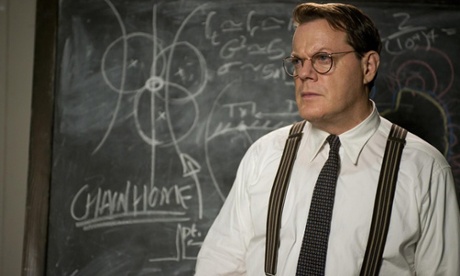
Biopics of British scientists are suddenly in vogue: with Benedict Cumberbatch as Allan Turing and Eddie Redmayne as Stephen Hawking coming down the pipe, the BBC have got in early with this long form TV drama about Robert Watson-Watt, the Scottish engineer credited with inventing and developing the radar systems that helped the Royal Air Force fend off the Luftwaffe during the second world war. It also provides a very good role for Eddie Izzard, who uses his mercurial intelligence to good effect in suggesting Watson-Watt's intuitive leaps and self-doubting impasses.
No two ways about it, this has been framed as a rousing patriotic story, with a side-order of bash-the-establishment. The opening section has the stuffed shirts of Whitehall demanding the development of a "death ray" to combat the unstoppable re-armament of Nazi Germany in the mid-1930s. Watson-Watt shows up to suggest something else, a warning system based on reflected radio waves. Watson-Watt is put to work, with the film making great play of Watson-Watt's dislike of ties and Oxbridge types, and insisting on the recruitment of his chums from the Meteorological Office. (To suit the we're-all-in-this-together mood, Watson-Watt's team are carefully pan-British, with Welsh and Yorkshire scientists in there too.)
As is customary in science movies, there's lots of scribbling equations on blackboards with key words circled – "RANGE", "COMMUNICATION" and the like. Izzard also has repeated scenes where he explains the theory and practice of radar in Ladybird-book language: "It's like a FISHING NET," he tells his Whitehall employers (and us, sitting the other side of the digital box receiver). Naturally Watson-Watt has to discover his softer side, and bond with his team as well as reconnect with his wife Margaret (Laura Fraser, who doesn't have much to do other than frowning at her home jewellery-making set-up). Whitehall infighting also rears its head, as interdepartmental rivalries among the plummy-voiced set threatens to scupper Watson-Watts's funding.
Izzard, bearing a striking resemblance to Kenneth Branagh, is very likable in the role; he gets across the suggestion of a lively mind in action without the array of comedy tics he tends to use in live performance. Director Gillies MacKinnon, probably best known for his mid-90s work Small Faces and Regeneration, does a sturdy job in putting together a well-constructed drama. It's a film that is unlikely to bring the house down, but will work well on the small screen, where it currently seems destined to reside.

